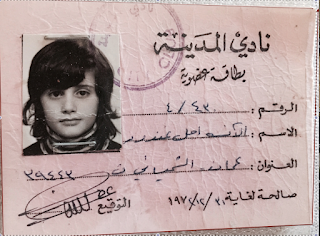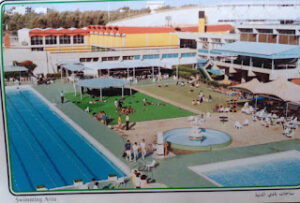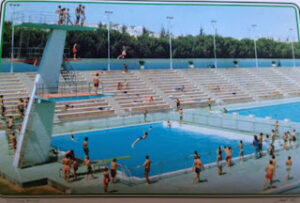Number 430
Number 430
I remember vividly Amman in the 1970s. The kind of city, the kind of time, made for storybook memories.
Quaint, quiet, snail paced, a collage of leafy gardens, single storey houses of stone, low rises so easy on the eye, middle class neighborhoods inches close to rich ones, poor ones still not tucked away in the crevices of vacuums and divides—Amman promised one long purr of a life.
If I had to summarize it all in one word, if I had to choose one place that evoked the temperament, the seeming possibilities of that era, faster than the flicker of an eye I’d pick il Madineh, The Sports City For Youth. And I suspect on the face of many Ammanis of my generation reading these words now there’s already the faint shape of a smile.
In summers that teased one’s yearning for eternities, the children of Amman’s rising middle class flocked to the sprawling compound, which opened its doors in 1971, to swim and play and chat and laugh. The pools, the squash and basketball courts, the long stretches of green lawns, the cafeteria on the right for hummus, hot dogs and French fries, the restaurant on the other side for adults, veal escalope and chocolamu. The Royal Culture Center by night, the immense football stadium for the big fights.
 My 1972 Sports City Membership Card: no 430
My 1972 Sports City Membership Card: no 430
Il Madineh is where my heart first fell hard in love, where I had my first kiss behind the diving pool. It’s where I learned my best strokes, perfected my ping pong ace, rolled on the grass every afternoon with a severe attack of the giggles and sunbathed every morning on the Roman amphitheater-like steps, giddy at the prospect that all will be well.

The Olympic Pool and Green Lawns
A bubble? Nostalgic bourgeois mush? After all, 1970-1971 was our bloody civil war. In the 1970s, Palestinian refugee camps, factories of despair and fantastical dreams, were no less a fixture of our landscapes than the ruins of old. These were also the years when the state and the Muslim Brotherhood had just come together openly to smother the leftist and secular pulse wherever it beat. This was the decade that came on the heels of 1967 and the loss of the West Bank, Jerusalem and Haram al Sharif. And so on and so forth.
We were not oblivious to politics. How could we be? It ran even more then than now in our veins. It kickstarted the day in the kitchen and sealed it each evening in the living room.
But if il Madineh was a cocoon sown out of fibs and yarns, it didn’t feel like one in the ‘70s. It didn’t stand apart from the rest of the city, alone and lonely. It might have been an oasis, but in many ways Amman was too: efficient, ordered and orderly, breezy, unfettered, unaffected. Simple. Sure, barriers and boundaries separated constituencies and destinies, but they were less like walls and more like paravans.
The complex itself was patiently conceived, well thought out, beautifully executed. It exuded hope, implied vision. By way of ambitions, it was King Hussein at his most benevolent—certainly at his most intriguing. When he was approached, in 1961, by a group of Jordan’s well to do requesting to offer him a gift in celebration of his marriage to Princess Mona, he asked them to build a sports city for Jordan’s youth. And so they did, after a concerted fundraising campaign within the business community.

The Diving Pool
il Madineh offered my generation a prototype of Jordan at its most open, spirited, accomplished. Looking back, it’s very tempting to describe it as the bastard child of a fling between raw self-interests and grand intentions. But, in the 1970s, looking forward, its symbolism appeared innocent of such fly-by-night origins. What I mean to say is that none of it was inevitable or foreordained. None of it! Only in retrospect, as we add the pages of subsequent chapters, does it all come full circle for us. No, we were not deceived in the 1970s, it’s just that other priorities and their trajectories took hold and proceeded to lay waste to the promise of those years.
It’s all gone now, of course. Well, the edifice of il Madineh is still there, but nothing else. Not that vitality, not that Amman, not that Jordan, not that future as we imagined it. So, yes, History, alas, is as unkind as it deserves to be. Recently, on the hunt for photographs of the old hangout, I came across this cautionary note on one of the tourist websites:
This complex in northern Amman has an Olympic-sized pool…Note that women may feel uncomfortable swimming here…
I suppose that’s why those times have often come back to me. I think of them as the last installment of a century pockmarked with wrong turns, smothered opportunities and blithe disregard for the terrible consequences of terrible decisions taken in every corner of the Middle East.
I often say that a chronology of postcards is all it takes to grasp the devastation wrought by decades of Arab misconduct and mismanagement. Il Madineh is one such postcard.
****
I hoard other precious relics from the 1970s. I remember Sah al Nawm, a brilliant satire of Kafkaesque Arab systems confounding the hell out of their subjects. I remember as well Martin Smith’s The World at War, still a documentary like no other on the Second War. I remember Hotel Philadelphia, a landmark erased for no good reason at all. The ease with which we walked in and out of Cinema Khayyam and Bassman downtown. Aqaba, a small, bare beachfront. The best moments were those a friend of mine and I stole in my older brother’s glassed balcony, listening to Santana’s Black Magic Woman and Otis Reading’s I’ve Been Loving You Too Long, all while Bruce Lee stared down at us, chest bare and chiseled.
Forty years on, among the flood of images of war, from everywhere, on every continent, the photo hovering above this post still haunts me. Perhaps because it could have been me. Or because it evoked horrors not my own but still mine to mourn. That it appeared on the screen to Carl Davis’ powerful musical interpretation of the meaning of world war must have helped keep it dramatic and close.
I recall that the most affecting moments in the 26 episodes were the private diaries and letters to loved ones that betrayed the true sense of human loss—prose distilling meaning from mindless bloodshed. Now, we spectate, minute-by-minute, the pain unleashed by this century’s round of wrath and loathing. You first force yourself to keep watching and reading because your future literally depends on it. But the mind numbing noise and rush of visuals—a ton of photos, a ton of articles and experts with a ton of opinions—obscure what is actually a fathomable if unruly narrative.
So, I decided perhaps it’s time for some quietude; time to search much closer to home, where life is at its dearest and most personal, for humanity and context. And wouldn’t you know it, the first fragment to appear to my mind’s eye was il Madineh.
Farewell for now. And thank you for lending an ear throughout the past nine years.
